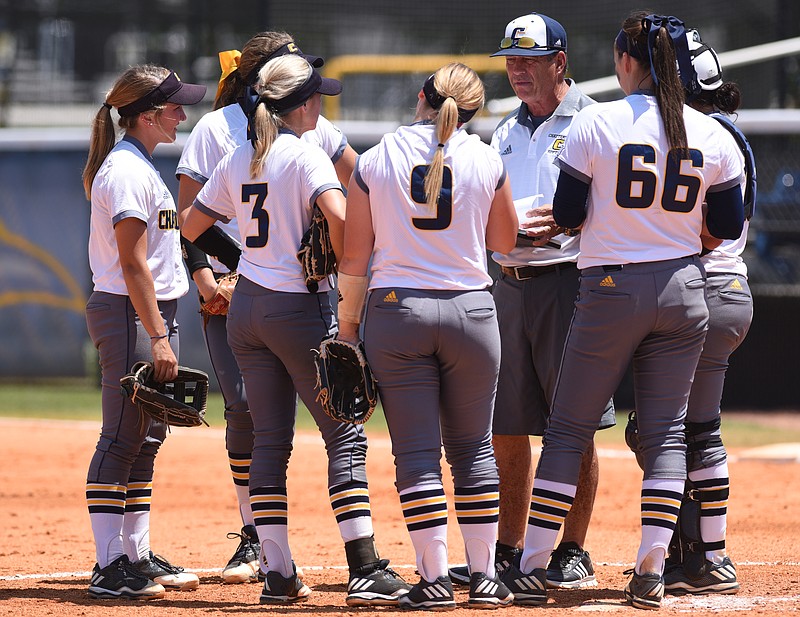Sure, having eight Southeastern Conference softball teams among the last 16 standing in the NCAA tournament is nice. It's almost as impressive as having all 13 of its softball-playing schools (Vanderbilt doesn't field a team) make the opening weekend of the NCAA tourney.
And the draw will guarantee at least two SEC schools among the eight to reach the Women's College World Series in Oklahoma City, since Tennessee hosts Texas A&M and Florida hosts Alabama in this weekend's super regional round.
Let the four other league teams - Auburn (which hosts Oklahoma in a rematch of last year's NCAA championship series), Kentucky (at Oregon), LSU (at Florida State) and Ole Miss (at UCLA) - all win and the SEC could have 75 percent of the World Series field.
But should we be surprised? Or is this simply the current and probable future state of major college softball?
"The SEC is the best of the best," University of Tennessee at Chattanooga coach Frank Reed said Monday. "Sixteen years ago, when I first came here, the SEC was just getting started in softball. When we went to Florida State for the 2002 regional, Alabama, Auburn and Georgia Tech were all there and we were one game shy of a super regional, losing to Florida State. Now the SEC is the dominant league."

The numbers from recent World Series finals strongly support that. The SEC has had the winner or runner-up for six springs in a row. In 2014, Florida topping Alabama, it had both schools. And three of the last five champs have come from the league - the Gators going back-to-back in 2014 and 2015 after Alabama won it all in 2012.
This isn't to say there's been a complete shift from the Far West, given that the Pac-12 still has four schools alive among the final 16. But after the Pac-12 (then the Pac-10) won 10 of 11 titles from 2001 to 2011, the SEC has won three of the last five with Oklahoma winning the other two in 2013 and last season.
Reed believes a major reason for that shift is facilities.
"When we played at (SEC member) South Carolina in 2009, it was almost like a high school field," Reed said. "Now they've got one of the best facilities in the country. And it's that way all over the SEC. Auburn's place looks like a football stadium. With Frost Stadium and our indoor practice facility, we were ahead of the game 16 years ago. Frost is still a great place, but everybody in the SEC has a great stadium now."
As former UTC coaches Ralph and Karen Weekly prepare the Vols for Friday's 6 p.m., best-of-three series opener against the Aggies, they believe more than money has played a role in the SEC's rapid softball rise.
"Youth softball in the South has grown exponentially since we arrived at UTC in 1994," the Weeklys co-wrote in a Monday evening email. "We would trace a lot of the growth to the Atlanta Olympics in 1996 and the excitement generated by softball's first appearance in the Olympic Games. Then the SEC added softball and it exploded from there.
"Atlanta is one of the fastest growing areas in the country for softball talent, and the entire region is producing great youth teams who are competing for national championships at every age level. The South is now a hotbed for recruiting."
Reed agrees.
"If you look at SEC rosters, the majority of the kids now come from the South instead of out West. You look at Alabama and Auburn rosters, for instance, and a lot of kids are walk-ons. They've grown up loving those schools and they're willing to play there for nothing rather than come to play for us for a partial scholarship. And these are really good players. A lot of our Southern states are producing some of the best players in the country now."
For proof, merely look at the rosters of Auburn and Tennessee, which are hosting super regionals. Though the Weeklys always have heavily recruited the Left Coast, only five California players are on their 23-woman roster. Eight are from the Volunteer State and seven hail from other SEC states.
Auburn's 26-player roster is even more homegrown, with 13 coming from Alabama and eight from other SEC states. Only four come from California.
Nor does Reed see any reversal to this trend in the years to come unless Pac-12 schools begin to invest in playing palaces like the SEC has done.
"You've have some players leaving the West Coast for several years because the SEC has nicer facilities," Reed said. "A lot of West Coast teams haven't upgraded their facilities. You can't beat money, and the SEC seems to have more of it than anyone else right now."
And as the rest of the country is seeing in football, men's and women's basketball, baseball and softball, the SEC's money is beginning to make it the dominant conference in almost every sport that generates any measurable amount of ticket sales.
Or as the Weeklys wrote: "SEC institutions are committed to building first-class facilities for their softball programs, hiring excellent coaches and recruiting nationwide. The SEC in general is always committed to being the best in every sport they sponsor, and softball is no different."
Now if the league only could have gotten the NCAA to slightly alter its regional seeds, SEC softball just might have owned all eight World Series slots instead of possibly grabbing six.
Maybe next year.
Contact Mark Wiedmer at mwiedmer@timesfreepress.com.

